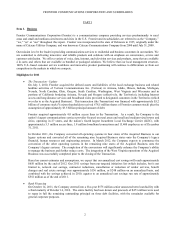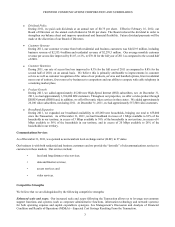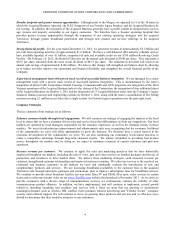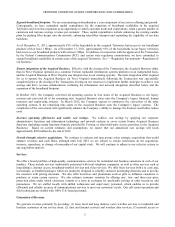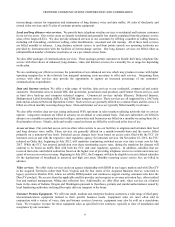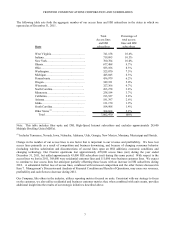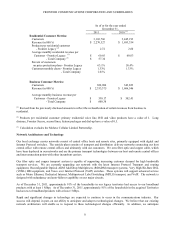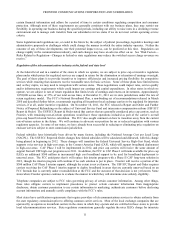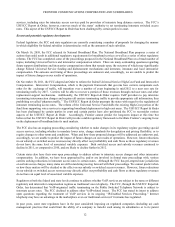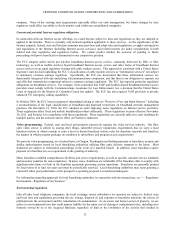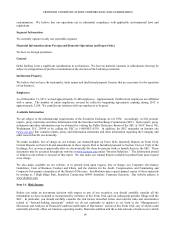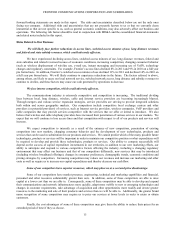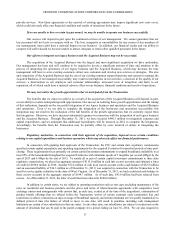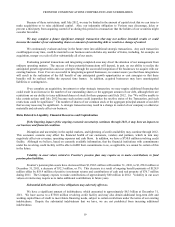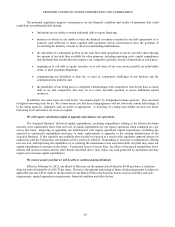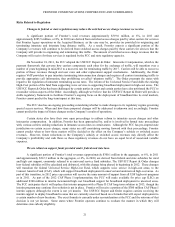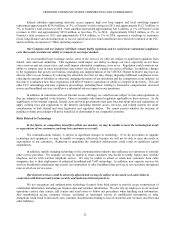Frontier Communications 2011 Annual Report Download - page 15
Download and view the complete annual report
Please find page 15 of the 2011 Frontier Communications annual report below. You can navigate through the pages in the report by either clicking on the pages listed below, or by using the keyword search tool below to find specific information within the annual report.FRONTIER COMMUNICATIONS CORPORATION AND SUBSIDIARIES
12
services, including rates for intrastate access services paid by providers of intrastate long distance services. The FCC’s
USF/ICC Report & Order, however, removes much of the states’ authority to set terminating intrastate switched access
rates. This aspect of the USF/ICC Report & Order has been challenged by certain parties in court.
Recent and potential regulatory developments
Federal legislators, the FCC and state regulators are currently considering a number of proposals for changing the manner
in which eligibility for federal subsidies is determined as well as the amounts of such subsidies.
On March 16, 2010, the FCC released its National Broadband Plan. The National Broadband Plan proposes a series of
actions that could result in additional regulatory requirements for broadband services as well as a series of other regulatory
reforms. The FCC has completed some of the proceedings proposed in the National Broadband Plan on a broad number of
topics, including Universal Service and intercarrier compensation reform. There are many outstanding questions regarding
future support distributions and intercarrier compensation reform that remain open, the outcome of which may significantly
change Federal Universal Service funding and disbursement mechanisms and interstate, intrastate and local intercarrier
compensation. The outcome and timing of these proceedings are unknown and, accordingly, we are unable to predict the
impact of future changes on our results of operations.
On November 18, 2011, the FCC adopted an Order to reform the federal Universal Service High-Cost Fund and Intercarrier
Compensation. Intercarrier Compensation, which is the payment framework that governs how carriers compensate each
other for the exchange of traffic, will transition over a number of years beginning in mid-2012 to a near zero rate for
terminating traffic by 2017. Carriers will be able to recover a portion of those revenues through end user rates and other
replacement support mechanisms. Additionally, the USF/ICC Report & Order requires VoIP providers to pay interstate
terminating interconnection charges and requires all carriers terminating traffic to provide appropriate call information, thus
prohibiting so-called “phantom traffic.” The USF/ICC Report & Order preempts the states with regard to the regulation of
intrastate terminating access rates. The reform of the Universal Service Fund shifts the existing High-Cost portion of the
fund from supporting voice services to supporting broadband deployment in high-cost areas. The USF/ICC Report & Order
has been challenged by certain parties in court and certain parties have also petitioned the FCC to reconsider various
aspects of the USF/ICC Report & Order. Accordingly, Frontier cannot predict the long-term impact at this time but
believes that the USF/ICC Report & Order will provide a stable regulatory framework to facilitate Frontier’s ongoing focus
on the deployment of broadband into its rural markets.
The FCC also has an ongoing proceeding considering whether to make changes in its regulatory regime governing special
access services, including whether to mandate lower rates, change standards for deregulation and pricing flexibility, or to
require changes to other terms and conditions. When and how these proposed changes will be addressed are unknown and,
accordingly, we are unable to predict the impact of future changes on our results of operations. However, future reductions
in our subsidy or switched access revenues may directly affect our profitability and cash flows as those regulatory revenues
do not have the same level of associated variable expenses. Both switched access and subsidy revenues continued to
decline in 2011, as compared to 2010, and are likely to decline further in 2012.
Certain states also have their own open proceedings to address reform to intrastate access charges and other intercarrier
compensation. In addition, we have been approached by, and/or are involved in formal state proceedings with, various
carriers seeking reductions in intrastate access rates in certain states. Although the FCC has pre-empted state jurisdiction
on certain access charges, many states are still considering moving forward with their proceedings. We cannot predict when
or how these matters will be decided or the effect on our subsidy or switched access revenues. However, future reductions
in our subsidy or switched access revenues may directly affect our profitability and cash flows as those regulatory revenues
do not have an equal level of associated variable expenses.
Regulators at both the federal and state levels continue to address whether VoIP services are subject to the same or different
regulatory and intercarrier compensation regimes as traditional voice telephony. The FCC, through the USF/ICC Report &
Order, has determined that VoIP-originated traffic terminating on the Public Switched Telephone Network is subject to
interstate access rates. The FCC declined to address other VoIP-related issues. The FCC has stated its intent to address
open questions regarding the treatment of VoIP services in its ongoing “IP-Enabled Services Proceeding.” Internet
telephony may have an advantage in the marketplace over our traditional services if it remains less regulated.
In past years, some state regulators have in the past considered imposing on regulated companies (including us) cash
management practices that could limit the ability of a company to transfer cash among its subsidiaries or to its parent


